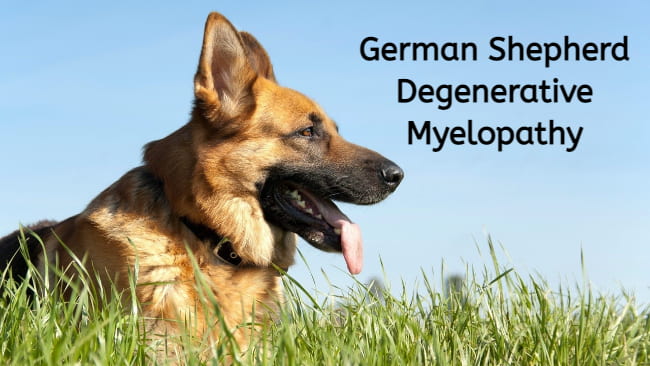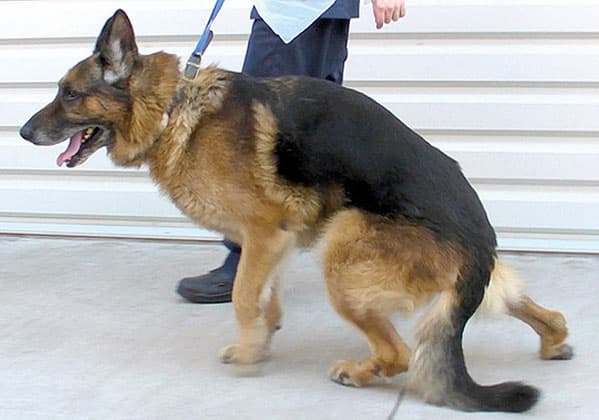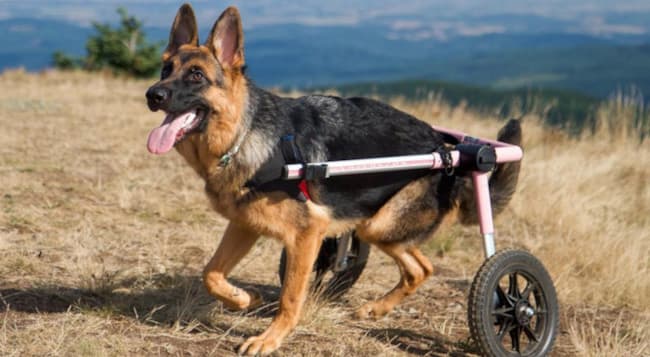If you are the owner of a German shepherd, then you need to be aware of the risk of german shepherd degenerative myelopathy. This is a devastating disease that can cause paralysis and death in dogs. While there is no cure for this disease, there are treatments available that can help improve the quality of life for affected dogs.

In this article, we will discuss what German Shepherd degenerative myelopathy is, how it affects German shepherds, and the treatment options available. We will also tell you can to do to help prevent your dog from developing this disease.
German Shepherd Degenerative Myelopathy
Degenerative myelopathy is a serious disease that affects German shepherds and other dog breeds. The disease causes progressive paralysis due to degeneration of the spinal cord, and it can lead to death in affected dogs. It usually affects older dogs, and there is no cure for this condition.
German Shepherd degenerative myelopathy attacks the spinal cord in the dog’s body, resulting in a loss of coordination and movement. Over time, this can lead to paralysis and other serious symptoms. Because there is no cure for degenerative myelopathy, treatment options focus on managing the disease and improving the quality of life for affected dogs.

The causes of degenerative myelopathy are not fully understood, but it is believed that genetics may play a role. Additionally, there are certain risk factors associated with the disease, including obesity and joint problems.
German Shepherd Degenerative Myelopathy Symptoms
The following are common symptoms of degenerative myelopathy in German shepherds:
- Trouble walking or standing
- Loss of coordination and balance
- Painful back, hips, or legs
If you notice any of these symptoms in your dog, it is important to see a veterinarian right away. There are treatments available that can help manage the symptoms of degenerative myelopathy and improve the quality of life for your dog.
Also, see How many puppies can German Shepherd have.
German Shepherd Degenerative Myelopathy Treatment & Diagnosis
The first step in treating German Shepherd degenerative myelopathy is a thorough diagnosis by your veterinarian. This will involve a physical exam, blood tests, and imaging scans of the spine to look for any abnormalities.
There are several treatment options available for dogs with degenerative myelopathy. These may include medications to manage pain and inflammation, physical therapy and rehabilitation, nutritional counseling, and other lifestyle changes. With proper care and support, your dog can lead a happy, healthy life despite this condition.
If you have a German shepherd or any other breed that is at risk of degenerative myelopathy, it is important to take steps to prevent the disease from developing. This may include feeding your dog a healthy diet, maintaining a healthy weight, and ensuring that they get plenty of exercises.
You should also make sure to visit the vet regularly for checkups and routine care. By taking these steps, you can help keep your dog safe from degenerative myelopathy and other serious diseases.
Is Degenerative Myelopathy Painful in Dogs?
While there is no definitive answer to this question, some experts believe that degenerative myelopathy may be painful for dogs. This is because the disease causes damage and inflammation in the spinal cord, which can affect nerves and cause pain sensations.

If you are concerned about your dog’s pain levels or other symptoms of degenerative myelopathy, it is important to speak with your veterinarian for professional advice and treatment options. Read on to know about Chow Chow German Shepherd mix crossbreed too.
How To Prevent Degenerative Myelopathy
As a German shepherd owner, there are several things you can do to help prevent your dog from developing degenerative myelopathy. This includes feeding them a healthy diet, maintaining their ideal weight, and ensuring that they get enough exercise and regular checkups with the vet.
By taking these steps, you can help keep your dog healthy and reduce their risk of developing this debilitating disease. So if you love your German shepherd, make it a priority to keep them as healthy as possible!
Whatever steps you take to prevent degenerative myelopathy, remember that early diagnosis is key. If you notice any signs or symptoms in your dog, be sure to get them to the vet right away for a proper diagnosis and treatment plan.
Conclusion
With the right care, your dog can live a happy and healthy life, even with this serious condition. So take good care of your German shepherd and give them all the love they deserve! We hope this article has been informative and helpful in understanding german shepherd degenerative myelopathy. Stay tuned to our German Shepherds site for more useful guides.
